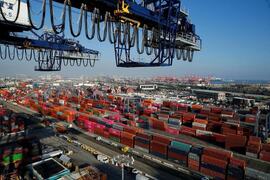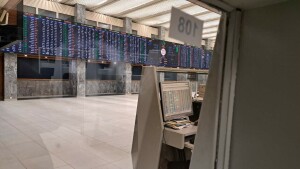 LONDON: Emerging equities tumbled three percent on Tuesday to over one-month lows, set for their worst daily fall since November 2016 as the global stocks rout intensified.
LONDON: Emerging equities tumbled three percent on Tuesday to over one-month lows, set for their worst daily fall since November 2016 as the global stocks rout intensified.
Investors have scrambled for the exit in the wake of Friday's data showing the largest US wage growth since 2009. This has fuelled expectations of faster rate hikes, driving 10-year US Treasury yields to four-year highs.
MSCI's benchmark emerging stocks index fell 2.8 percent to over one-month lows, taking its cue from developed markets after Wall Street suffered its biggest percentage drop since August 2011.
"The fear is that should inflation rise faster in the US then the Fed would have to tighten more than is currently priced in, which would mean a stronger dollar, plus higher financing costs and lower capital flows to emerging markets," said Jakob Christensen, head of emerging markets research at Danske Bank.
He added that the sell-off was not a sign the world economy was heading for trouble, but more a reflection of stretched valuations in global equity markets after a prolonged bull run without any big corrections.
Asian markets set the tone, with big losses across the board. Hong Kong led the selling, down 5.1 percent, its worst daily fall since August 2015. Hong Kong is particularly exposed to US rate moves because its currency is pegged to the US dollar.
Index heavyweight Taiwan fell almost five percent, its biggest one-day fall since August 2011. Chinese mainland shares fell around three percent with the Shanghai index posting its biggest one-day fall in nearly two years.
The selling extended into European trading with Turkish stocks sliding 1.7 percent after touching a record high last week, while Poland lost 2.4 percent and Hungary shares 1.7 percent.
The average yield spread of emerging market bonds over US Treasuries on the JPMorgan EMBI Global Diversified index was at 277 basis points (bps), a one-month high, after widening 19 bps since the start of February.
South African assets remained in focus as pressure mounted on scandal-plagued President Jacob Zuma to quit. Zuma has summoned cabinet ministers to a meeting in Cape Town today.
"This is the power struggle I expected would happen," said Christensen. "It's hard to imagine a completely smooth process to remove Zuma and there are factions within the ANC that are still backing him."
South African stocks tumbled two percent to four-month lows, and South African dollar bonds fell across the curve, with the 2041 issue losing 0.7 cents.
The country's five-year credit default swaps rose five basis points (bps) from Monday's close to 154 bps, according to IHS Markit data, a fresh one-month high, but the rand firmed 0.2 percent, helped by a slightly weaker dollar.
Other emerging currencies were also a touch firmer, with Tukey's lira and Russian's rouble up 0.3 percent , and the Chinese yuan up 0.26 percent.























Comments
Comments are closed.